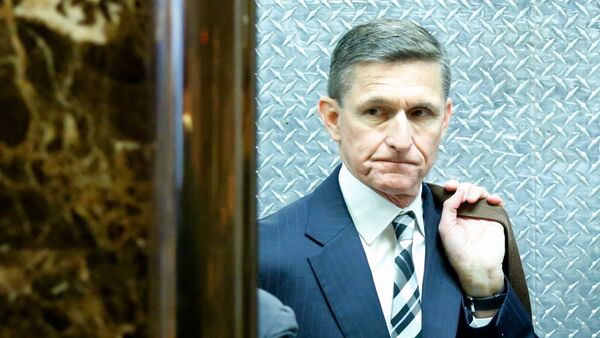The transcripts of the calls between Michael Flynn and Russian Ambassador to the US Sergei Kislyak between December 2016 and January 2017 make for an interesting ‘what might have been’ reading on Russia-US relations, showing what could have been had the FBI not entrapped the incoming national security advisor over his perfectly above-board contacts with Kislyak as part of the toxic ‘Russiagate’ narrative which would go on to take nearly three years to squash.
The redacted transcripts of the conversations, made public by Iowa Republican Senator Chuck Grassley on Friday after being declassified by the Office of the Director of National Intelligence, conclusively demonstrate a lack of criminal behaviour by Flynn, or any ‘collusion’ between himself and Russia.
Perhaps more importantly, they offer a glimpse of how Trump’s top aide on national security issues planned to patch up relations with Moscow in the wake of the lowpoint reached during the twilight of President Obama’s second term.
Israel Resolution
In a transcript dated December 23, 2016, Flynn asks Ambassador Kislyak if Russia could assist then-President-elect in blocking a UN Security Council Resolution demanding an immediate halt to all Israeli settlement activities in Palestinian territories. This attempt to lobby Moscow came in the wake of the Obama administration’s refusal to veto the resolution amid cooling US-Israeli ties.
“You know that the strategic goal is stability in the Middle East. That’s the strategic goal…We will not achieve stability in the Middle East without working with each other this radical Islamist crowd,” Flynn says, referring to Hamas.
Kislyak interrupts: “General! If you allow me to…complete my presentation of these points…We will try to help…to give additional time for the conversation on this issue. But if it is put to vote, for historical reasons, as I explained to you…we cannot…other than to support it…That’s something, that is part of the position that we have developed within countries in the region for a long period of time.”
The resolution ended up passing the same day, with the Security Council, including Russia, voting 14-0 in favour while the US abstained. Flynn's first attempt to lobby the Russians had failed.
Cooperation Against Daesh
A second conversation, dated December 29, 2016, starts off with an interesting tidbit on Russian officials' bewilderment over the Obama administration's 2016 election 'hacking and meddling' claims. Dmitry Chernyshev, a member of the Russian ambassador’s staff, can be heard saying on an open mic before Flynn's voice message turns on: “Which Agency hackers did the hacking? Believe me, Americans hacked this all.”
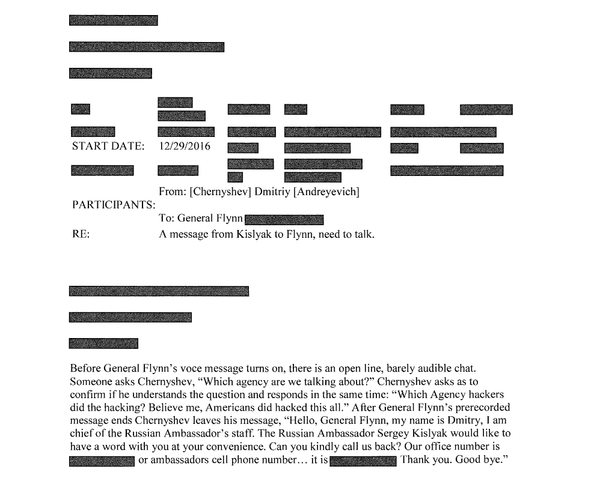
Later, in his return call, Flynn expresses concerns over the December 29 decision by the Obama administration to expel 35 Russian diplomats over alleged ‘Russian election hacking’.
“What I would ask you guys to do – and make sure you, make sure that you convey this, okay? Do not allow this administration to box us in right now, okay?” Flynn worriedly asks.
“So depending on what actions they take over this current issue of cyber stuff, where they are looking like they are going to dismiss some number of Russians out of the country. I understand all that…But I ask Russia to do is to not, if anything -I know you have to take some sort of action, to only make it reciprocal; don’t go any further than you have to because I don’t want us to go into something that has to escalate to tit-for-tat. Do you follow me, Ambassador?” Flynn continues.
“I understand what you’re saying, but you know, you might appreciate the sentiments that are raging now in Moscow,” Kislyak responds.
“I know! Believe me I do! I very much appreciate it! But I really do not want us to get into the situation where everybody goes back and forth…and [has] to be a tough guy here. We don’t need that right now. We need cool heads to prevail. And we need to be very steady about what we are going to do because we have absolutely a common threat in the Middle East,” Flynn adds, referring to the Daesh (ISIS)* terrorist group, which was in control of much of Syria and Iraq at that time.
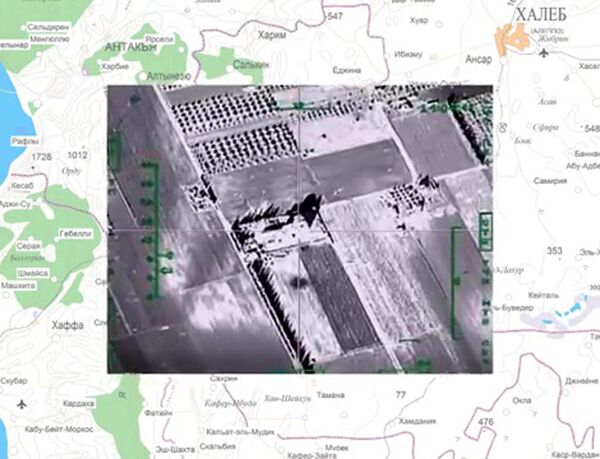
“We definitely have a common enemy. You have a problem with it. We have a problem with it in this country and we definitely have a problem with it in the Middle East,” Flynn urges.
Kislyak promises he will ‘try to make people in Moscow understand’.
“Remember Ambassador, you are not talking to a diplomat; you are talking to a soldier. I am a very practical guy. It is all about solutions,” Flynn stresses. "It's about very practical solutions that we're - that we need to come up with here. And uh, we have to stop talking past each other on - so that means we have to understand exactly what it is that we want to try to achieve, okay?"
Kislyak says he "fully" agrees.
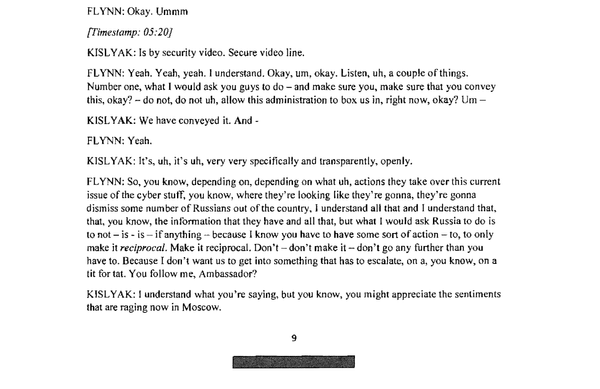
Three days later, December 31, 2016, Kislyak informs Flynn that Russia would not be making a tit-for-tat response to the US’s diplomatic expulsions, and tells the Trump aide that his proposal of the “need to act with cool heads” was “exactly what is invested in the decision.”
“That’s excellent,” Flynn responds, informing Kislyak that he was “looking to put a small team” together to join Russia and other nations in the Astana conference on Syrian peace in late January, reversing the Obama-era policy of ignoring Russia-sponsored Syria initiatives in favour of the Geneva process.
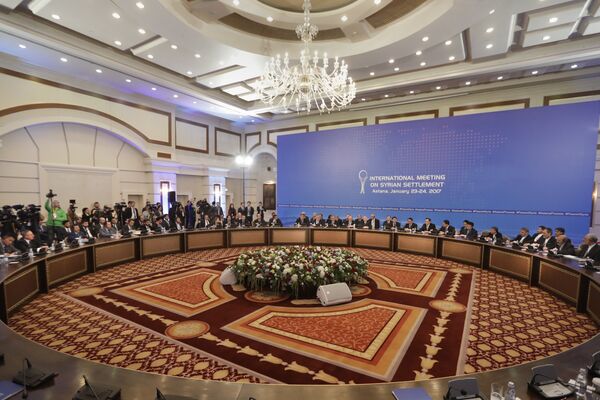
‘A Lot of Things in Common’
During the December 31 conversation, Flynn provided Kislyak (and the FBI agents listening in) insights into his overall worldview, and on the possible future of Russia-US relations under Trump as a whole with himself as national security advisor.
“You know, we are not going to agree on everything, you know that. But I think that we have a lot of things in common. A lot. And we have to figure out how, how to achieve those things, you know, and be smart about it and keep the temperature down globally as well as, not just, you know, here in the United States and also over in Russia,” Flynn says.
“You’re absolutely right,” Kislyak responded.
Flynngate
Flynn was forced to resign as national security advisor in February 2017 after being accused of lying to the FBI about his contacts with Ambassador Kislyak. Flynn initially pleaded guilty but later sought to withdraw his plea, accusing agents of entrapping him. Last week, two weeks after the Department of Justice dropped its case against Flynn after reviewing the evidence, Senate Homeland Security Committee chairman obtained an unredacted version of a memo on a January 5, 2017 White House meeting which indicated that former FBI director James Comey pushed President Obama to investigate Flynn over his contacts with Kislyak, despite a lack of any evidence of wrongdoing.
In 2018, Comey admitted to sending FBI agents to interview and potentially entrap Flynn at the White House in January of 2017, boasting that this was something he “probably wouldn’t have done or maybe gotten away with in a more organized administration.”
Trump eventually replaced Flynn with H.R. McMaster, a much more hawkish figure who bought into claims of Russian meddling in the 2016 election, and pushed the president to take a “tough” stance on Russia. McMaster was replaced by Bush-era Iraq war architect John Bolton in April 2018, with Bolton himself fired in September 2019. Robert O’Brien was named Trump’s national security advisor on September 18, 2019, and continues to serve in that capacity to this day.
* A terrorist group outlawed in Russia and many other countries.

